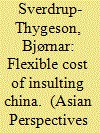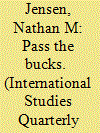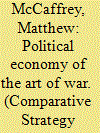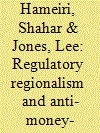|
|
|
Sort Order |
|
|
|
Items / Page
|
|
|
|
|
|
|
| Srl | Item |
| 1 |
ID:
134567


|
|
|
|
|
| Summary/Abstract |
How do we consolidate developing democratic regimes in the Global South so that the life expectancies of these regimes are considerably sustainable? What have been the key epistemological and normative shortcomings of the mainstream scholarship of democratization? How can we overcome these limitations? Is it necessary to consider the global political economy as a fertile source for deducing some explanatory variables that will help us understand the sources of democratic instability at the national-domestic spheres of political governance? In view of these questions, I contend that there are fundamental limitations in the mainstream scholarship on democratization that we have to overcome. In this essay, I critically appraise the nature of the democratization debate by positing that existing material inequities and injustices in new electoral democracies in the developing world are constitutive of global hegemonic interests that function as the critical determinants of democratic stability. Second, I propose some corrective suggestions that will perhaps inspire a new research agenda about democratization that should overcome the limitations of the current mainstream social science scholarship on democratization. Finally, I articulate some concluding substantive remarks on why we need to bring the global political economy back into our scholarly analyses of democratic consolidation.
|
|
|
|
|
|
|
|
|
|
|
|
|
|
|
|
| 2 |
ID:
135181


|
|
|
|
|
| Summary/Abstract |
Today’s global society has an unprecedented need for proper and reliable scientific advice. That is because the contemporary world is facing a variety of issues—climate change, energy crises, food security, epidemics—in which science, technology, and society are tightly intertwined. To address these issues, appropriate mechanisms that bridge science and policy making must be established. At the same time, one must recognize that the globalization of the political economy in the past few decades has changed the modality of national borders in every aspect. As a result of these changes, scientific enterprise and relevant socioeconomic activities as well as public policies may have consequences on all parts of the world.1 Thus, scientific advisory systems today need to effectively function not only within individual countries but also in the international context.
|
|
|
|
|
|
|
|
|
|
|
|
|
|
|
|
| 3 |
ID:
136993


|
|
|
|
|
| Summary/Abstract |
The proliferation of civic groups has been one of the most intriguing features of China’s societal transformation over the past three decades. The massive spread of non-governmental organizations (NGOs) has given rise to a broad debate among China scholars about the nature of Chinese state–NGO relations. Several authors have developed theoretical concepts that highlight and explain the multifaceted and highly complex nature of relations between civic organizations and the party-state. Against this backdrop we develop the notion of embeddedness versus marginalization to unravel these complexities and clarify ambiguities. Drawing on in-depth case studies of nine Chinese NGOs working with children and youth, this article proposes a comprehensive conceptualization of Chinese civic groups’ political embeddedness versus marginalization. First, we identify three separate indicators of embeddedness: formal registration, informal ties with public authorities, and the political economy of NGO–government relations. Second, we discuss three factors that have a major influence on these indicators of embeddedness. While some of the dynamics discussed might be specific to children and youth NGOs, comparisons with the findings on NGOs working in different fields suggest that the notion of embeddedness versus marginalization may also apply to other sectors of social activism. Therefore, our study offers a more nuanced understanding of Chinese state–NGO relations.
|
|
|
|
|
|
|
|
|
|
|
|
|
|
|
|
| 4 |
ID:
134762


|
|
|
|
|
| Summary/Abstract |
China’s engagement in Africa is an increasingly popular topic in the 21st century. However, not much attention has been paid in the field of education and little evidence can be seen in what actually happens on the ground. This article aims to explore China’s educational aid to Africa, from both textual and fieldwork sources. It will focus on three parts: first, the existing recognition of Chinese distinctions in foreign aid and China’s donor logic based on “win-win” strategies; second, an argument that China’s donor logic in educational aid might be informed by producing soft power through “public diplomacy”; third, a discussion of people’s perception collected in Tanzania, including voices from officials and returning African students. The article will take China’s main educational approach, the Government Scholarship Scheme as an example, and look at how this educational practice has been processed in a “diplomatic” way. It is concluded that China’s educational aid and its features in practice, based upon diplomatic policies and China’s distinctive donor logic of foreign aid, is serving bilateral relations rather than orthodox aid relations. If quality transformation and communication can be maintained in the Chinese universities, education would contribute to a lasting and cooperative relationship between China and Africa. It may add more complexities to “soft power” within broader conceptions under the contemporary global political economy.
|
|
|
|
|
|
|
|
|
|
|
|
|
|
|
|
| 5 |
ID:
136439


|
|
|
|
|
| Summary/Abstract |
This study explores the role of domestic politics in China’s health-related development assistance to Africa. It identifies domestic politics as a constant, even critical, component in shaping and structuring China’s health aid to Africa. Until the late 1970s, foreign policy considerations determined the volume, direction and terms of China’s foreign aid, but since the 1980s domestic political economy has dominated China’s health aid policy process. China today utilises development assistance for health not only to expand its global influence and improve its international image, but also to serve the market and resource needs of its domestic economic development. An examination of existing policy-making and implementation regimes in health aid highlights the role of bureaucratic politics and other political-institutional variables in affecting the form, substance and effectiveness of foreign aid to Africa. The findings have important implications in China’s willingness and capacity to cooperate with the global donor community in Africa.
|
|
|
|
|
|
|
|
|
|
|
|
|
|
|
|
| 6 |
ID:
136610


|
|
|
|
|
| Summary/Abstract |
What accounts for the spread of Sovereign Wealth Funds (SWFs)? Despite the increasing importance of SWFs in the global economy, we lack persuasive systematic answers to that question. Most analysts take for granted that economic imperatives drive the creation of SWFs; governments create them as effective solutions to the challenges generated by reserve accumulation and commodity-export specialization. In this article, I argue that the evidence fails to support this theory. Instead, the spread of SWFs best resembles the diffusion of a fashion or fad. SWFs became fashionable as an appropriate approach for reserve- and resource-rich countries seeking to manage policy uncertainty related to these economic characteristics. As other countries developed the same characteristics, they followed the lead of their peers and also created SWFs. I provide, with the use of a new data set, the first cross-national political-economy statistical analysis of SWF creation. The results suggest peer group emulation has, indeed, been crucial in shaping the decision of many countries to create SWFs—especially in fuel-exporting countries.
|
|
|
|
|
|
|
|
|
|
|
|
|
|
|
|
| 7 |
ID:
137187


|
|
|
|
|
| Summary/Abstract |
In this article, I investigate trade relations between Norway and China after the 2010 Nobel Peace Prize was awarded to Liu Xiaobo, a leading Chinese dissident. It is a case study of China's political use of economic levers in its international relations. Concluding that Sino-Norwegian trade relationship did not suffer the severe impact that many predicted, I argue that the threshold for China to enact punitive economic actions seems higher than is often acknowledged. China's sensitivity is to the costs and benefits of the relevant country's trade.
|
|
|
|
|
|
|
|
|
|
|
|
|
|
|
|
| 8 |
ID:
136162


|
|
|
|
|
| Summary/Abstract |
Does foreign aid prop up authoritarian regimes or is it conducive to democratic reforms? We use a two-level perspective that takes the domestic incentives of both the recipient and the donor into account to review the existent literature respecting this question. By bringing together research on democracy and autocracy with the literature on aid effectiveness and the political economy of aid provision, we provide a political economy perspective against which the mixed effects of foreign aid on political regimes can plausibly be explained. Against this background, research on aid effectiveness may give more attention to incentives in recipient countries and may take on a more comprehensive perspective on international relations. At the same time, the debate on authoritarianism may also gain insight into authoritarian strategies by investigating aid negotiations.
|
|
|
|
|
|
|
|
|
|
|
|
|
|
|
|
| 9 |
ID:
134531


|
|
|
|
|
| Summary/Abstract |
The Affordable Care Act of 2010 (ACA) is a landmark in American social policy that is disrupting America’s “liberal tradition.” It is successfully expanding access and compelling insurers to change their business models to serve more socially-useful purposes; cost control enjoyed initial success but confronts barriers rooted in America’s resilient political economy. The ACA is disrupting long-standing patterns of American politics, introducing new developmental paths that unsettle or, in certain respects, offset the familiar patterns of selectivity, deference to private markets, and “drift” that tend to produce government inaction as economic insecurity increases. New policy arrangements for financing and delivering medical care is ushering in a new politics of US health care that are resetting the terms of future debate; the ACA is also challenging familiar approaches to studying politics including analyses of framing, policy effects and political development, and American political thought.
|
|
|
|
|
|
|
|
|
|
|
|
|
|
|
|
| 10 |
ID:
135295


|
|
|
|
|
| Summary/Abstract |
Comparisons of peacebuilding with historic practices of imperialism are common, but these comparisons have sustained a hegemonic antagonism between humanitarian and imperialist interpretations of international peace intervention. This article argues that this common framing externalises the problem of intervention, romanticises local resistance, and forecloses to investigation the articulation between militarised peace practices and transnational capitalist relations. To do so, the article analyses the case of Francophone Africa, thus providing a context that has been left unexplored in peacebuilding debates. By bringing back in the historicity of particular Franco-African imperial experiences into peacebuilding research, the article reveals the militarisation of politics, transnational elite networks, and the dominant intellectual predispositions that work to reproduce the legitimacy of hegemonic practices of ‘peace’ interventionism. In the last section, the article analyses the debates over the UN-French 2011 intervention in Côte d'Ivoire to reveal the connections between the ethics of humanitarian interventions and the political economy of imperialism. The article concludes that the imperial legacy of peacebuilding is found in old capabilities, new organising logics, and specific practices and power relations and that to focus on the humanitarian-imperialist antagonism caricatures the relationships between ‘local’ and ‘international’ actors.
|
|
|
|
|
|
|
|
|
|
|
|
|
|
|
|
| 11 |
ID:
135776


|
|
|
|
|
| Summary/Abstract |
This volume presents a multifaceted, multidisciplinary exploration of Israel, using a theory-guided analytical narrative and offering a broad overview that addresses the various aspects of Israeli society as well as issues that were of major public importance during the six-and-half decades of the state's existence, many of which have never been studied before from the perspectives presented here.
|
|
|
|
|
|
|
|
|
|
|
|
|
|
|
|
| 12 |
ID:
134639


|
|
|
|
|
| Summary/Abstract |
This paper explores the motivations behind the outward foreign direct investment (ofdi) decisions in the past decade of an East Asian government-linked corporation (glc), the largest company of its kind in the world in terms of sectoral specialisation. This glc has travelled far from its origins as an agent of European imperialism to its current controversial role spearheading postcolonial extra-territorialisation strategies. I argue that financial predation is the synechdoche for territorialisation in the new imperialism. Consequently emerging economies pre-empt the financial siege by embarking on ofdi strategies themselves to create economic buffer territory. I construct a psychoanalytical framework for examining how anxiety is acted out in the global economy. I apply concepts of the traumatic moment, anxiety and the defence mechanisms of disavowal, splitting, introjection and projection to analyse the glc’s investments as territorial displacements of the libidinal economy.
|
|
|
|
|
|
|
|
|
|
|
|
|
|
|
|
| 13 |
ID:
136931


|
|
|
|
|
| Summary/Abstract |
In December 2011, ‘a volcano of social activism that had long been dormant started to erupt in Russia’ (Petrov 2012). A tidal wave of mass protest movements swept through the capital and then engulfed scores of Russia's regions. These demonstrations came as a great shock to the Russian leadership. After decades of the passive acceptance of the status quo it appeared that civil society was at last wakening up, and that it was members of a rising middle class which were at the forefront of the protests against the regime. As Aron observed, ‘No longer burdened with providing for the basic needs of their families and now enjoying perhaps unprecedented, for Russia, personal freedoms and prosperity, the middle class's more socially active members appear to believe they are entitled to become stakeholders in a functioning, fair, and less corrupt state’ (Aron 2012, p. 4).
|
|
|
|
|
|
|
|
|
|
|
|
|
|
|
|
| 14 |
ID:
135465


|
|
|
|
|
| Summary/Abstract |
Migration in its broadest sense implies spatial mobility, which is as old as human civilization itself. Research on migration came to be institutionalised since the 1960’s in the Western academia. The colonial states twin projects of state building and development led to the emergence of entirely new forms of migration, which were firmly rooted in the political economy of the colonial state and were highly gendered. Labour migration occurred within the confines of the colonies, in the emerging urban centres, mining and industrial sites and commercial farms became an important site for migration studies. The large-scale human movements at the behest of the colonial state, whether voluntary or forced, constitute an arena for the migration researchers. Researches on migration have focussed too on early migrations, in terms of the trans-Atlantic slave trade in the Americas. In the past two or three decades, however, also the African dimensions of the Atlantic slave trade, “African slavery” and the “oriental slave” trade have been increasingly well researched.
|
|
|
|
|
|
|
|
|
|
|
|
|
|
|
|
| 15 |
ID:
135289


|
|
|
|
|
| Summary/Abstract |
The European Union's (EU) trade and development ‘partnership’ with the African, Caribbean, and Pacific (ACP) countries has long interested scholars of North-South relations. Historically, the theoretical literature on ACP-EU ties has been characterised by liberal institutionalist accounts of interdependence and critical assessments of Europe's neo-colonialism. In the timeframe of the Cotonou Agreement (2000–20), this division has expressed itself in relation to liberal assessments of Europe's pursuit of pro-poor market reforms in the Post-Washington Consensus and critical accounts of Europe's neoliberal ‘development’ agenda. This article argues that a moral political economy offers an innovative lens for the latter critical assessment of ACP-EU ties. With a constructivist focus on Europe's normative ‘development’ agenda, a moral economy standpoint may draw attention to the EU's role in (re)embedding poverty through recourse to legitimating ethical discourse. This is seen to enable the critical school to more closely consider ideational/discursive power in response to contemporary liberal institutionalist accounts. The article focuses on the European Investment Bank (EIB) and its activities in ACP countries – with particular focus on the Bank's Investment Facility (IF) – as an exemplar of the disjuncture between norms and outcomes.
|
|
|
|
|
|
|
|
|
|
|
|
|
|
|
|
| 16 |
ID:
134513


|
|
|
|
|
| Summary/Abstract |
Both countries and subnational governments commonly engage in competition for mobile capital, offering generous incentives to attract investment. Existing economics research has suggested that these tax incentives have a limited ability to affect investment patterns and are often excessively costly when measured against the amount of investment and jobs created. In this paper, we argue instead that the “competition” for capital can be politically beneficial to incumbent politicians. Building off work on electoral pandering, we argue that incentives allow politicians to take credit for firms' investment decisions. We test the empirical implications of this theory using a nationwide Internet survey, which employs a randomized experiment to test how voters evaluate the performance of incumbent US governors. Our findings illustrate a critical political benefit of offering such incentives. Politicians can use these incentives to take credit for investment flowing into their districts and to minimize the political fallout when investors choose to locate elsewhere.
|
|
|
|
|
|
|
|
|
|
|
|
|
|
|
|
| 17 |
ID:
135008


|
|
|
|
|
| Summary/Abstract |
A peculiar model of post-communist political economy has evolved in Belarus under President Aliaksandr Lukashenka. It features prioritisation of non-entrepreneurial social groups, a strong role for the state, and extensive social security provision. The model appears to be grounded on Lukashenka's understanding of his political powerbase; having no external backing for his policies, he wants to command as wide grass-roots support as possible to remain in office. By doing so, he rejects the principles of pluralist democracy and market economy, making Belarus's political economy model quite different from that envisaged in the mainstream post-communist theories of neo-liberalism and gradualism.
|
|
|
|
|
|
|
|
|
|
|
|
|
|
|
|
| 18 |
ID:
134713


|
|
|
|
|
| Summary/Abstract |
Political and economic outcomes depend, in part, on the quality of the officials making policy. Some argue that free elections are the best method for selecting competent officials. Others argue that elections lead to the selection of amateurs and demagogues. We use original data on the biographies of Russian regional governors to examine the backgrounds of elected and appointed governors. Elected governors are more likely to be locals. Appointed governors are more likely to be federal bureaucrats or hold a graduate degree. We conclude the paper by speculating on other possible explanations for variation in governor background.
|
|
|
|
|
|
|
|
|
|
|
|
|
|
|
|
| 19 |
ID:
134652


|
|
|
|
|
| Summary/Abstract |
Sun Tzu's The Art of War deals with the economic aspects of military operations as well as some more general economic principles. This article studies several of its economic ideas in turn: on war and the state, the effect of war on economic affairs, and the role of incentives in promoting desired behavior within military organizations. It also discusses how the text treats ideal military strategy as a matter of opportunity discovery, analogous to entrepreneurship in the work of Israel Kirzner.
|
|
|
|
|
|
|
|
|
|
|
|
|
|
|
|
| 20 |
ID:
136952


|
|
|
|
|
| Summary/Abstract |
With the intensification of the Financial Action Task Force's (FATF's) worldwide campaign to promote anti-money-laundering regulation since the late 1990s, all Asian states except North Korea have signed up to its rules and have established a regional institution—the Asia/Pacific Group on Money Laundering—to promote and oversee the implementation of FATF's 40 Recommendations in the region. This article analyses the FATF regime, making two key claims. First, anti-money-laundering governance in Asia reflects a broader shift to regulatory regionalism, particularly in economic matters, in that its implementation and functioning depend upon the rescaling of ostensibly domestic agencies to function within a regional governance regime. Second, although this form of regulatory regionalism is established in order to bypass the perceived constraints of national sovereignty and political will, it nevertheless inevitably becomes entangled within the socio-political conflicts that shape the exercise of state power more broadly. Consequently, understanding the outcomes of regulatory regionalism involves identifying how these conflicts shape how far and in what manner global regulations are adopted and implemented within specific territories. This argument is demonstrated by a case study of Myanmar.
|
|
|
|
|
|
|
|
|
|
|
|
|
|
|
|
|
|
|
|
|